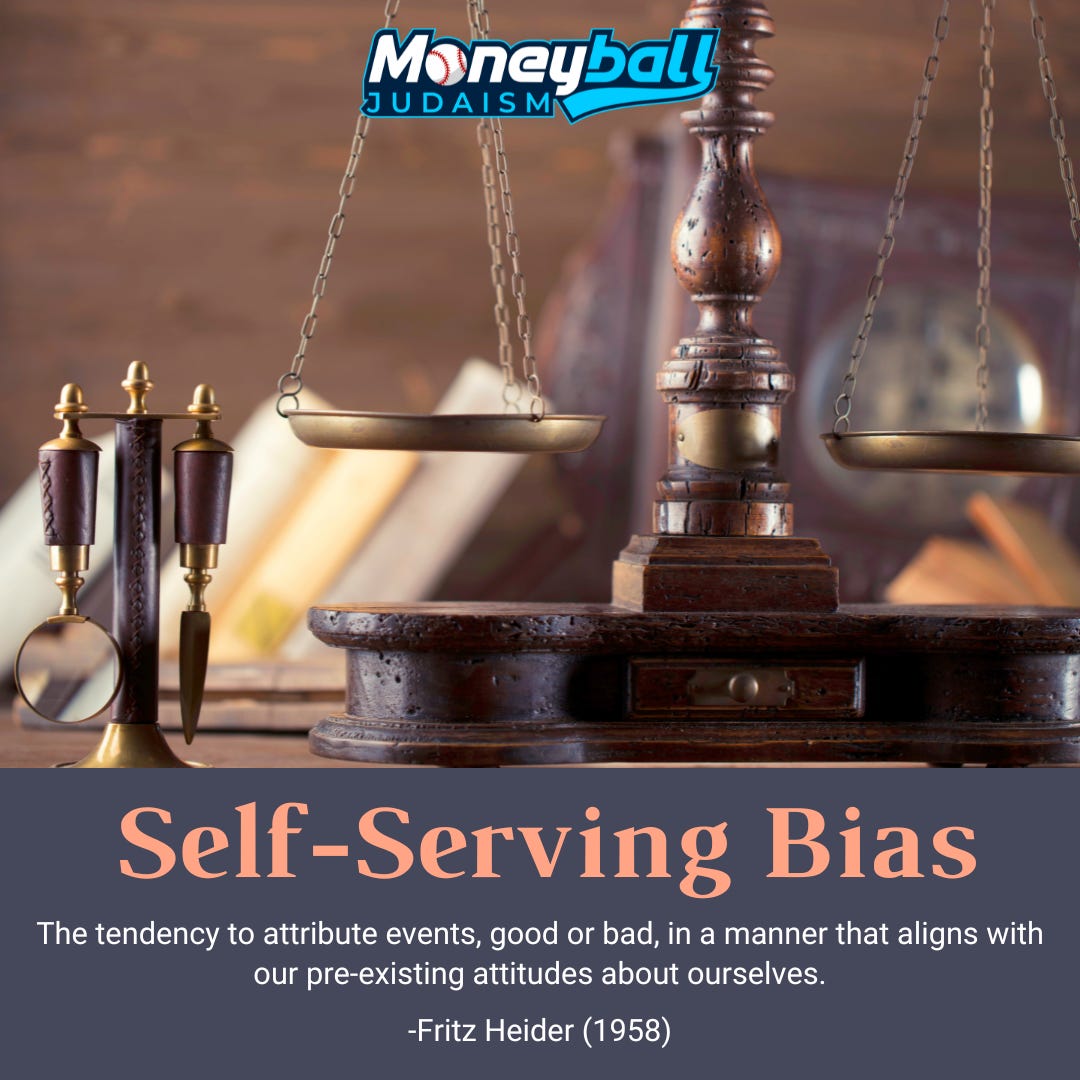
Discover more from Moneyball Judaism
“I praise loudly. I blame softly.” -Catherine the Great
I don’t enjoy failure.
(Who does?)
And I take it very personally.
(Who doesn’t?)
But while there is a justified tendency in leadership literature to extol the virtues of failures, a gap exists between the knowledge that failure is a necessary learning experience and the messy reality that most of us hate the idea of anyone directly identifying failure with us. While one finds countless examples of someone imploring us to “dare to fail,” you will never find someone encouraging us to “dare to be a failure.”
Current events remain on my mind, and I remain committed to keeping Moneyball Judaism focused on explanation rather than opinion. As I’ve started to zoom out a little bit from the current situation in Israel and focus on what we can learn through the lens of Moneyball, I keep returning to a theme that tends to rear its head when tragedies happen: Blame.
(Important Caveat: This piece is about the temptation of Jews in Israel and abroad to blame EACH OTHER, as opposed to blame between Israel and other entities. The latter is an essential but separate conversation.)
Very few people in authority have the luxury of starting a position with a blank slate; most inherit an agenda from a predecessor. Sometimes, that inheritance will be pristine and sometimes a trainwreck. But most of the time, leaders take over organizations in a middle zone between thriving and failure; how leaders interpret failure and their role in that failure tells us a great deal about how they understand themselves and others.
Right now, the focus needs to stay on the health and safety of the countless people suffering, especially bringing home the Israelis taken hostage by Hamas. And yet, I suspect many of us following the news already see cracks of blame between entering the conversation, making it worth our time to explore the cognitive biases at the heart of the inclination to blame. No matter where you stand, these cognitive biases affect us all, even when we claim they don’t.
Self-Serving Bias
When was the last time you were involved in a significant group failure?
Pick an example, and then sit down and try and write the story of that failure. A few questions to consider:
When does the story start, and when does it end?
Who are the main characters?
What were the major decision points that, in hindsight, put this endeavor on the road to disaster?
And most importantly, how would you describe your role in this story?
Answering the last question is unavoidable, but if you’re like me, chances are that when you tell the story, you will see your role in one of two ways:
You were a minor character whose contributions were more valuable than the rest of your colleagues or
You were the sole person in the wilderness shouting “S.O.S” when no one would listen
However subtle or overt, we all know people whose default model when analyzing a failure is to shift blame from themselves and focus on others.
This is the self-serving bias.
In The Psychology of Interpersonal Relations, Fritz Heider develops the foundation of what becomes known as the self-serving bias through his chapter on a person’s “Naive Analysis of Action.” Heider argues that when evaluating their role in a situation, a person will search for an “acceptable attribution” that aligns with their “self-attitudes.” Since most people want to see their role as a net positive, they will do anything to identify themselves as the story’s “villain.” Heider writes:
“...there are two factors that determine the selection of the acceptable attribution: (1) the reason has to fit the wishes of the person, and (2) the datum has to be plausibly derived from the reason. The first refers to the affective significance of an event. That reason is sought that is personally acceptable. It is usually a reason that flatters us, puts us in a good light, and it is imbued with an added potency by the attribution. The second factor is that of the “rationality” in every “rationalization.” What is selected as acceptable cause is not just anything that fits with the personal needs and wishes of the life space. It also has to fit the cognitive expectations about connections between motives, attitudes, and behavior, etc. It has to fit the system of naive psychology; the less far-fetched the rationalization is, the better it will follow this system.”1
Returning to the storytelling metaphor, a person gets a “final cut” on the story they tell themselves about a failure, and, whether they know it or not, the story will pass through a mental filter before they finalize the narrative. Thus, when Heider says that people seek a “personally acceptable” reason to explain an event, a great deal of space opens to interpret failure in the most favorable light for the interpreter (i.e., themselves). Hence, our inclination to explain our positive role in a failure to ourselves and others is inherently self-serving.
This puts most of us in a no-win situation. On the one hand, it’s not hard to imagine how recent events can turn (or are already turning?) into an exercise in blame. On the other hand, sometimes people are selected to clean up someone else’s mess. The story gets messy quickly, which brings us to one of the most remarkable case studies in corporate blame games and a fantastic example of the self-serving bias played out in real-time.
Power Failure
Although I am an obsessive reader of leadership, I rarely read autobiographies. I’ve always found them to be self-serving money grabs, at best, or score-settling revisionist histories, at worse. Either way, it never seems worth my time.
For this reason (and others), I never embraced the tao of Jack Welch, the longtime CEO of General Electric (GE), who was once named the “CEO of the Century” for making GE the world’s most valuable company.
Today, GE is no longer listed on the Dow Jones Industrial Average. This massive fall is the subject of William Cohan’s Power Failure: The Rise and the Fall of an American Icon, which Cohan describes as “a cautionary tale about hype, hubris, blind ambition, and the limits of believing—and trying to live up continuously to—a flawed corporate mythology." For those who want an even briefer summary, I would describe Power Failure as the story of two CEOs, Jack Welch and his successor, Jeff Immelt, blaming each other for GE’s downfall, leaving the reader to decide who is right.
This is not a critique of Power Failure; the book was excellent and highly readable. Ultimately, success and failure are not linear, and one cannot quickly determine who is at fault for one company’s downfall. But for our purposes, Power Failure is a valuable case study about how the self-serving bias rears its ugly head when things go wrong.
Cohan’s introduction captures these two narratives beautifully. Jack Welch argues that on September 7, 2001, Jeff Immelt was given an incredible foundation to build GE “until he [Jeff] started fucking around…He was the CEO of the year with those assets that I gave him.”2 Jeff Immelt argues that Jack created “problems everywhere…that…[Jack] ignored or obfuscated, through a combination of…bluster…and effusive charm.”3 And no matter where one falls, much of the book is Cohan’s attempt to sort out the historical record of what happened amidst these two narratives.
Every leader wants to be the hero of their story but will do anything to avoid being labeled the villain when things go wrong. And the reason is hard-wired into our brains. In part, these cautionary tales should give us pause when assuming that a single person is the sole cause of a significant success or failure, but also remind us that leaders who reject that dichotomy will garner respect for their unwillingness to blame others habitually.
And this brings me back to present events…
I’m fascinated by how the military and medicine analyze failure, as each field deals with life and death matters; the military analyzes failure through their after-action review (AAR) and medicine through a morbidity and mortality conference (M&M Conference). While I do not doubt that professionals in each field could quickly identify ways they would tweak these models, it’s a powerful aspiration that when examining failure, we should aspire, as Angus Fletcher, Preston B. Cline, and Matthew Hoffman argue, to “generate a collective story that everyone owns as their story,”4 instead of looking at failure as a chance to point fingers while hiding our role.
Right now, Israelis and Jews need my love and support. That is my number one priority. And I can already sense that many will use this moment to argue that this never would have happened had everyone else listened to them, their organization, their political party, etc.
Don’t let them.
At best, that argument is self-serving. At worst, it is narcissism of the worst kind, assuming that the tragedy should focus on the credibility of the often wrong prognosticators as opposed to the needs of the suffering.
Don't fall into that cognitive trap.
We owe each other better.
Malcolm Gladwell and William Cohan
What I Read This Week
Celebrating Claudia Goldin: As a reminder that human beings still produce excellent intellectual contributions, please read this article about Professor Claudia Goldin, the recent Nobel Prize in Economics winner. We learned about Goldin almost a year ago, but it’s worth revisiting as she is deservedly lauded for her contributions to gender equity, economics, and much more.
More on the Replication Crisis: The New Yorker ran a provocative piece on the replication crisis in behavioral science, which we learned about a few weeks ago. Read it and stay curious.
Communication Happens in the Carpool: Remember the perhaps apocryphal quote from Steve Jobs that he built Apple’s headquarters to maximize serendipitous encounters between employees? It turns out that casual interactions make a difference, but not always in the ways we’d expect.
Working Home Does Not Damage Productivity: The evidence continues to mount that working from home helps productivity rather than hurts it. I trust Nicholas Bloom, and you should, too.
Tire Pressure and Productivity: Welcome back, Cal Newport.
Ibid., 6.
Subscribe to Moneyball Judaism
Moneyball Judaism is a free weekly newsletter that provides Jewish leaders with easy-to-digest explanations of trends in behavioral economics, social psychology, decision sciences, and organizational development.








